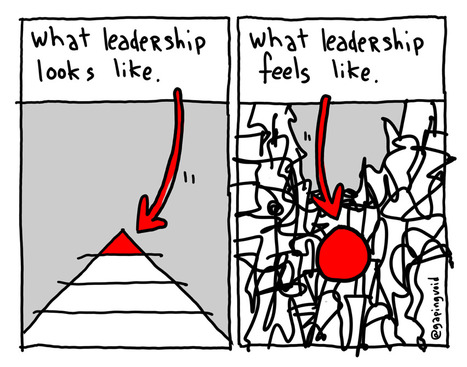 Your new post is loading...
 Your new post is loading...
We might spend days, months, or even years trying to figure someone out. Is he who he says he is? Should I trust her? The wheels in our head spin as we think of all the variables and how they'll play out. And still, we keep hearing that we should just listen to our instincts. Complicated questions, simple answer. What should we do, and where did this whole idea of the gut instinct come from, anyway? Intuition isn't some magical, mysterious quality that we carry with us. It actually comes from the knowledge and past experiences that we all carry. Even if we're unable to explain why we feel the way we do, there's a logical explanation behind our gut feelings. Whenever you encounter anything new, the unconscious side of your brain is constantly making assessments. It takes in certain cues, such as a smile or parts of a story, and then matches it with something similar in our database of memories to come up with a conclusion. Meanwhile, our conscious side remains unaware of this rapid process taking place.
Via The Learning Factor
You have three outstanding assignments sitting on your desk, your phone is lighting up with texts from your roommate reminding you of that party you don’t want to attend, and then your boss swings by to ask if you can stay late to help out on seven other tasks that need finishing. Before you can stop yourself, “Uh, sure! I mean, of course,” tumbles out of your mouth. You know full well that you’re unable to handle another thing, but there’s just something about saying no that’s almost impossible to do.
Via The Learning Factor
If you’ve ever had a miscommunication or failed to comprehend what someone else was trying to say, it could be that your perceptual languages are getting in the way. Discovered by development psychologist Taibi Kahler, perceptual languages are the different processes of how people communicate. The way people communicate often carries more information than the words themselves, says clinical psychologist Nate Regier, cofounder of the communication-coaching firm Next Element.
Via The Learning Factor
A group job interview. A high-stakes board meeting. A pitch to investors. If you’ve been in any of these situations, you know how hard it can be to speak confidently, articulately, and convincingly. Even if you think you know your message really well, speaking becomes a lot more challenging when the stakes are high. But while you can’t exactly control the outcome, you can control how you communicate in the moment. Here's how to speak well in even the most intimidating environments.
Via The Learning Factor
There’s definitely some truth in the wisdom that it’s better to overcommunicate than undercommunicate. Ideally, every manager gives their team members just enough direction to get on course and the leeway to do their thing free of micromanagement. The reality is often different, though. No good boss wants to leave their teams feeling empty-handed or unsupported, so they sometimes veer off too far in the opposite direction. I’ve learned the hard way that overcommunication is easier to fall into than you might think, and it winds up obfuscating my message and wasting everyone’s time. Fortunately, I’ve managed to get better at figuring out when my communication is more distracting than useful. Here are some of the key criteria I use in order to tell whether I'm overcommunicating
Via The Learning Factor
Imagine trying to communicate with customers that speak 11 different languages and come from dozens of different cultures. How would you help them understand how to manage their debt when they never had credit before? On a recent episode of mypodcast, YPO's 10 Minute Tips From the Top, I interviewed Ian Wason, CEO ofIntelligent Debt Management (IDM), on how he solved these exact problems. Wason, a member of Young Presidents' Organization (YPO), related how his company is able to help clients in South Africa overcome their debt issues with a 90 percent success rate, which is substantially higher than his competitors. The key for him is strong and creative communication. Here are his tips for communicating effectively with your customers. 1. Identify their pain. Successful communication with a customer starts with understanding. By identifying their needs, you are more likely to develop an appropriate solution. Moreover, by showing them empathetically that you understand their pain, they will also see that you care and will be more willing to work with you.
Via The Learning Factor
Consider a delinquent taxpayer who receives one of the following two letters in the mail: Letter 1: We are writing to inform you that we have still not received your tax payment of $5,000. It is imperative that you contact us. Letter 2: We are writing to inform you that we have still not received your tax payment of $5,000. By now, 9 out of 10 people in your town have paid their taxes. It is imperative that you contact us.
Via The Learning Factor
All workplaces have some challenges and negative characteristics, so it can be difficult to determine if your workplace has a normal amount of challenges, is seriously dysfunctional, or possibly really toxic. Here are five signs that will help you determine the degree to which your work environment may be dangerous to your mental health. 1. Unhealthy Communication Patterns An initial sign of a dysfunctional, toxic workplace is that there are significant problems in communication, and often across multiple areas—between employees and their supervisors, from management to supervisors, across departments, with suppliers, and even with customers.
Via The Learning Factor
Welcome to the 2014 Ketchum Leadership Communication Monitor (KLCM), exploring the perceptions of over 6,500 people in 13 countries on five continents regarding effective leadership, effective communication and the intrinsic link between the two. The third annual KLCM survey shows clearly that a global leadership “crisis” stubbornly persists, as consumers continue to be disillusioned with their leaders. Looking at leaders in business, government, community service, trade/labor unions and the not-for-profit sector, only 22 percent of those surveyed feel leaders are demonstrating effective leadership – down from last year – and even fewer than that are optimistic about seeing any improvement in leadership over the coming year. The research also finds that open, transparent communication is absolutely critical to effective leadership. It is again the top-ranking attribute, with 74 percent viewing effective communication as very important to great leadership. Yet only 29 percent feel leaders communicate effectively. This gap between expectation and delivery has substantial commercial implications. Indeed, a clear majority of respondents boycotted or bought less from a company during the past 12 months due to poor leadership. Far fewer started buying or purchased more as a result of positive leadership perceptions.
Via The Learning Factor
|
All the data suggesting that coding is rapidly becoming an essential skill for any job–not just one in tech–only tells one side of the story. The other side indicates that soft skills such as critical thinking, problem solving, attention to detail, and writing proficiency top the list of what hiring managers find missing from job seekers’ personal tool kits. But according to theWorld Economic Forum’s Future of Jobs Report, one the job skills that will make a candidate competitive in the job market of the future is emotional intelligence. The WEF predicts it will be among the top ten in 2020. How emotionally intelligent are you now? There are several ways to test it (including one that’s so accurate it’s creepy). The good news is that even if you’re a bit deficient on some traits, emotional intelligence can be improved. Here are some suggestions on boosting your EQ right away.
Via The Learning Factor
We love talking about what millennials know. As a group that’s become the dominant force in the workforce, we applaud their smarts on tech, social media, and even the age-old practice of branding. Yes, millennials might arguably be one of the overall most intelligent generations to come around. However, that’s not to say they still don’t have a lot to learn, especially when it comes to face-to-face communication. As the generation that grew up with communication becoming more efficient via digital, their biggest strength could also be a critical weakness. While the way they say things has become more direct, their messages sometimes lack. Why? Because as one of the first to grow up in a digital world, they’ve been afforded a privilege not found in our day-to-day.
Via The Learning Factor
Whether you are building your business, trying to land your dream job or climbing your way up the corporate ladder, it seems like everyone tells you to network. It is the key to achieving your goals. However, people rarely tell you exactly how to network effectively and build a community that will last. Building a community takes a lot of dedication and has its challenges. I wasn't always the best at navigating social situations. In fact, I was and still am a bit of a geek. But, by applying my knowledge of science, I have formed stronger, longer-lasting relationships Here are three ways you can too:
Via The Learning Factor, Kevin Watson
Being able to communicate effectively, I believe, is one of the best life skills you can develop. Think about it, colleagues who can masterfully communicate their thoughts, feelings, ideas, concerns and wishes are better equipped to manage or avoid conflict, negotiate win-win scenarios, and increase their ability to collaborate at a high level. Yet effective communication isn't just about talking; it is also the ability to listen and understand the other side of the fence, to "read" and interpret body language, and to know how to approach another person so you can get your points across in a respectful manner.
Via The Learning Factor
Miscommunication happens frequently in life and work, partly because technology allows us to communicate faster, but not necessarily better. While some miscommunications are merely annoying, others can create conflict or be a disrupting influence in relationships. Based on being both the giver and the recipient of unintended communication gaffes, here are five reasons why I believe they occur, and what to do to prevent them in the future.
Via The Learning Factor
Communicating under pressure is a critical leadership component learned very early on during Navy SEAL training. Without having the ability to maintain composure, thinking clearly, gather information and make a call, you can’t succeed in combat. Which of course can lead to the worst possible outcome. The same applies in business leadership situations, without death and dismemberment of course. We all know what it’s like to have the perfect response pop into our heads after an important situation or verbal exchange, too late to be of any use. And then there are those who can face all kinds of conflict and seem to know exactly what to do and say. And they do so in a calm and tactful manner. Faced with an angry customer, an uncooperative co-worker or tense negotiation, they don’t stammer or get upset. They keep their cool and glide through the situation getting what they want without breaking a sweat. These are the people who typically rise rapidly through the ranks. But great communicators are made, not born. It’s simply about having the right tools and knowledge.
Via The Learning Factor
Tim Carr, an American working for a defense company based in the midwestern United States, was about to enter a sensitive bargaining session with a high-level Saudi Arabian customer, but he wasn’t particularly concerned. Carr was an experienced negotiator and was well-trained in basic principles: Separate the people from the problem. Define your BATNA (best alternative to a negotiated agreement) up front. Focus on interests, not positions. He’d been there, read that, and done the training.
Via The Learning Factor
Have you ever been in a job you hate so much that waking up is painful? Have you ever wished that you were born a different person with a different life? Have you ever hoped that an alien spaceship would capture your manager? There have been times in my life I thought these things.Years ago there a young grandfather who lived in Versailles, Indiana. He decided to have a sleep after lunch. While he lay on the couch his young 8-year-old grandson decided to play a trick on him and rubbed some smelly
Via The Learning Factor
Language is only the most obvious part of the global communication gap. Different cultures also have distinct approaches to communication during meetings, as described by British linguist Richard D. Lewis, whose best-selling book, “When Cultures Collide,” charts these as well as leadership styles and cultural identities. Lewis, who speaks ten languages, acknowledges the danger of cultural comparisons in his book: “Determining national characteristics is treading a minefield of inaccurate assessment and surprising exception. There is, however, such a thing as a national norm.”
Via The Learning Factor
|



 Your new post is loading...
Your new post is loading...

































Our facial perceptions of others can give startling insights into their success.